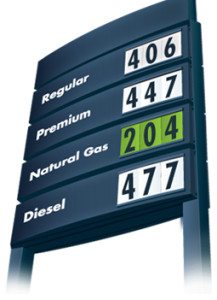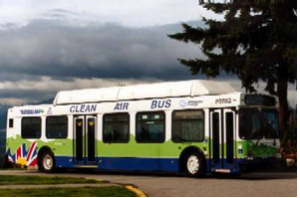Compressed Natural Gas Is Catching On
 Courtesy of Motley Fool, writer Matt DiLallo: Following the latest announcement for more than 900 new buses fueled by natural gas for Los Angeles and San Diego’s public transport needs, it’s now clear that compressed natural gas, or CNG, is really catching on with fleet operators.
Courtesy of Motley Fool, writer Matt DiLallo: Following the latest announcement for more than 900 new buses fueled by natural gas for Los Angeles and San Diego’s public transport needs, it’s now clear that compressed natural gas, or CNG, is really catching on with fleet operators.
This trend has been a boon for engine maker Cummins Westport, a joint venture between Cummins (NYSE: CMI ) and Westport Innovations (NASDAQ: WPRT ) .
It’s a trend that shows no signs of slowing down. Presently there are more than 7,000 buses in municipal service across North America fueled by natural gas. That number will continue to grow as more operators commit to 100% natural gas fueled buses. That’s the driving force behind this latest deal as purchaser LA Metro takes another step closer to its dedication of being 100% fueled by natural gas.
This order, as well as other substantial recent orders, is evidence of the growing acceptance of natural gas in the transit market according to Cummins Westport president Jim Arthurs. It’s really simple to understand why 30% of new transit orders are for vehicles fueled by natural gas. Those transit operators save about $1.50 per gallon and enjoy a simple one-year payback. Economics aside, transit operators also reduce greenhouse gas emissions by 28% when switching from diesel to CNG.
This one-two punch has meant big things to other industry participants, like Clean Energy Fuels (NASDAQ: CLNE ) . The company is a key partner for transit operators as it builds and operates the critical CNG refueling infrastructure. The company has ambitious plans to grow its natural gas refueling stations as more operators make the switch.
The good news for these companies is that transit operators are not the only companies catching on to the benefits for CNG. Refuse companies like Waste Management (NYSE: WM ) are also switching over to CNG. The fact of the matter is that switching over to CNG enables the company to take its “Think Green” motto to another level. Like transit operators the company enjoys a one-year payback on a new garbage truck. The economics again are simple, it costs the company roughly $30,000 more to purchase a CNG fueled truck, but the company will save around $27,000 per year in fuel. It’s no wonder why 85% of the company’s new truck purchases are now those fueled by natural gas.
 As the transportation market continues to whet its appetite for natural gas, this growing demand for the fuel is hopeful news for energy companies like Chesapeake Energy (NYSE: CHK ) . As the nation’s No. 2 producer of natural gas it needs to see increased demand for its profits to pick up. The company is putting money behind that hope; it invested $160 million into Clean Energy to help fund that company’s ambitious plans to build out the infrastructure necessary to make the switch to natural gas a reality.
As the transportation market continues to whet its appetite for natural gas, this growing demand for the fuel is hopeful news for energy companies like Chesapeake Energy (NYSE: CHK ) . As the nation’s No. 2 producer of natural gas it needs to see increased demand for its profits to pick up. The company is putting money behind that hope; it invested $160 million into Clean Energy to help fund that company’s ambitious plans to build out the infrastructure necessary to make the switch to natural gas a reality.
That being said, as the price of natural gas picks up from new demand it does affect the conversion economics for transit and refuse operators. Still, there is enough of an environmental incentive as well as a bit of patriotism at play to make the switch palpable, even if natural gas prices do tick up a bit.
That is why the momentum toward a natural gas economy has only just begun. While there are a myriad of opportunities for investors in this field, you shouldn’t look past the potential of Clean Energy Fuels. It’s poised to make a big impact on an essential industry. Read all about Clean Energy Fuels in our brand-new report. Just click here to get started.
Category: Fuel & Oil, General Update, Green, Management, News










